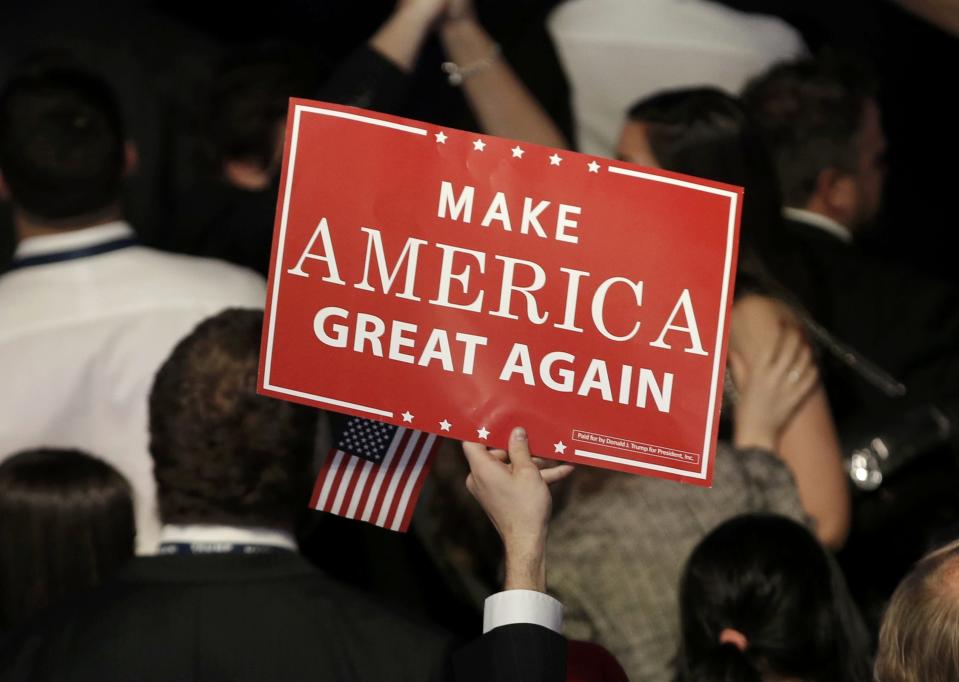Trump's jobs plan faces a bigger challenge than China

President-elect Donald Trump has promised to wage a war against globalization, to bring back jobs that corporations have sent abroad. But what about all the jobs that simply don’t exist anymore, left behind by advances in technology?
For anyone in the US manufacturing economy Trump has been describing, a job lost to China looks and feels identical to a job lost to technology, making it hard to effectively get to the bottom of what’s happening—and how to fix it for the American workforce.
From Federal Reserve data, it seems relatively clear that scapegoating China and Mexico misses a good portion of what’s going on. Domestic manufacturing sector output (blue line) is at an all time high, back to the pre-recession levels of 2008. But the red line, employment, shows that the output has not created jobs.

“US factories are not disappearing; they simply aren’t employing human workers,” Rice University professor of computational engineering Moche Vardi told Factor earlier this year. “Job losses due to automation and robotics are often overlooked in discussions about the unexpected rise of outside political candidates like Trump and Bernie Sanders.”
Compared to tough-talking trade policy, in which a country “stands up” to another, discussions about robots taking jobs don’t have satisfactory ends—yet, at least. But the spectre of significant technological job loss is very real, not just in the manufacturing sectors.
The evening after the election, one tweet went viral that illustrates the trouble the country could be in, having ignored technological job loss in favor of strawmen woven purely from trade and immigration issues. “The self-driving truck is all but in mass production at the moment and I just remembered this map,” the tweet read. Above the text were two maps, a data visualization from NPR showing the BLS’s most common job in every state, and a map of red and blue states.
the self-driving truck is all but in mass production at the moment and I just remembered this map pic.twitter.com/3oCkiyHNdn
— Findom De Siècle (@griph) November 10, 2016
It doesn’t take an economist to see the implications here. Technology is coming for American jobs in many sectors—and much more aggressively than any outsourcing ever could—and that tweet shows how high of a cliff we could be standing at.
Trucking has provided a go-to opportunity for people to earn middle-class wages without a college degree, and winter appears to be coming. Tesla has normalized “autopilot” on cars (even if it was premature), Ford and other automakers and tech companies have invested heavily in self-driving cars, and Uber-owned Otto became the first robot trucker, successfully making a 120-mile beer run in Colorado.
According to an Oxford Martin study published in 2013, 47% of total US jobs are at risk from robots—a number that’s likely to grow. Indeed, as a recent follow-up done in conjunction with Citi has shown, no relief has emerged.
People have been nervous about machines taking people’s jobs ever since the Luddites in the 19th century, but the study concluded that this time was different. The pace of tech has quickened, the scope of tech has broadened, and most importantly, “the benefits are not being widely shared—real median wages have fallen behind growth in productivity and inequality has increased.”
So how would policy approach issues of robots taking jobs? Considering the winners of increased automation are corporations and their shareholders, which save money by having a machine do the same job – faster, often better – without health insurance, unions, and sick days, it will be especially difficult to address it. Washington could never get away with forcing companies to employ people they don’t need.
As Vivek Wadhwa, an engineering professor at Carnegie Mellon put the question in the Chicago Tribune: “Trump may be able to keep immigrants out, but how will he stop the advance of robots?” Those robots will likely be an ever-growing hurdle for the president-elect making good on his promise of reinvigorating old-school manufacturing jobs.
Ethan Wolff-Mann is a writer at Yahoo Finance focusing on consumerism, tech, and personal finance. Follow him on Twitter @ewolffmann.
Read more:
History says Trump probably won’t repeal Dodd-Frank any time soon
What ‘Trumpcare’ will look like
Two professors predicted the Wells Fargo scandal—in 2014
Donald Trump could leave consumers on their own
How Facebook and Twitter make it seem like Trump makes sense
